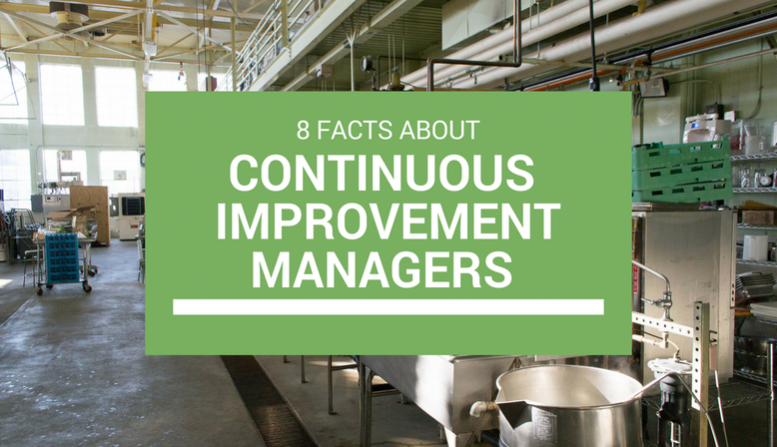8 Facts About Continuous Improvement Managers
Last Updated on July 6, 2025
At first glance, making a food production facility more efficient might seem as simple as speeding up a machine or adding more workers. While that can help in some cases, it’s rarely the best long-term solution. Food manufacturing is a complex process, and even small changes can have significant ripple effects.
In larger operations, production managers are often too busy to step back and focus on system-wide improvements. That’s why companies hire Continuous Improvement Managers. These professionals study how work gets done, identify bottlenecks, and find smarter, more sustainable ways to improve productivity and reduce waste.
1. Continuous Improvement Managers Drive Operational Efficiency
Continuous Improvement Managers (CIM) lead, coordinate and manage teams at manufacturing facilities. They use business improvement techniques such as six sigma and the pillars of continuous improvement to implement production improvements and procedures. Overall, they improve the productivity of food factories, which could lead to higher margins, less waste and better working environments.
Additionally, CIMs develop standard business processes that serve as a baseline in which everything can be compared to. They develop these standard processes by collecting and analyzing data from production runs and working with production staff. Finally, they work heavily with all personnel in the company, recommending and developing improvements. They also train staff on new processes to help ease the transition of new processes and learn from them.
2. Continuous improvement manages leverage business improvement methodologies
To streamline production and eliminate inefficiencies, CIMs rely on a toolbox of continuous improvement techniques including:
- Total Productive Maintenance: A holistic approach to equipment maintenance that emphasizes proactive and preventative maintenance to maximize the efficiency of equipment.
- Lean Techniques: A set of techniques that improve performance in the manufacturing of food.
- Six Sigma: A set of techniques used to improve processes within an organization by identifying errors or defects in a business to eliminate them.
3. Continuous improvement managers need to have project management experience
A successful CIM must possess a strong ability to lead projects. Every time a new improvement initiative begins, so does a project. Their job is basically managing and creating projects! CIMs ensure that projects are completed by knowing what needs to be done, how it needs to be done, and when it needs to be done by. Think about this on the grand scale of a food manufacturing facility. There are a lot of moving parts and people!
 4. Continuous improvement managers often hold degrees in engineering, business, or operations management
4. Continuous improvement managers often hold degrees in engineering, business, or operations management
This profession is typically not one that a new graduate enters right after school. They need to build up experience within the food industry and relevant manufacturing industries. Years of working experience gives individuals a better view of the big picture and places where improvements could occur.
As a result, CIMs have a wide range of educational backgrounds. Some examples include engineering, business, science or data science. Work experience is more valuable than education in this position. Potential employers judge the credibility of candidates by examining their past projects of building up a portfolio is essential to breaking into this field.
5. Continuous improvement managers are leaders
To drive improvements across a business, CIMs must be able to lead teams effectively. They create plans and understand how team members deliver results, simultaneously providing encouragement and constructive feedback. Through their actions, they create and maintain credibility across all levels in the business. Without good leadership, any project attempted will fail.
6. Continuous improvement managers are proficient in data systems
CIMs work with a variety of data, including daily production, product defect tracking and energy efficiency. Collecting data enables CIMs to monitor project costs and performance, as well as translate the data into actionable recommendations for improvement. However, collecting data is just one piece of the puzzle. CIMS must know how to interpret this data using programs such as Excel, SAP, and Minitab.
7. Continuous improvement managers are excellent communicators
Being able to communicate important details in improvement programs is an essential skill for CIMs. These professionals know how to speak the “why” of any process improvement and help employees to understand it. Communicating the “why” encourages motivated employees and allows management to meet company goals. Effective communication leads to the overall success of a project and makes it more cost-efficient.
8. Continuous improvement managers are problem solvers, leaders and organized individuals
Being a continuous improvement manager requires a wide range of skills. However, there are a few which stand out as particularly important. These skills include:
- Problem solving – Because CIMs are responsible for streamlining operations, they need to be able to identify problems and potential solutions. Effective problem solving involves identifying issues, understanding everyone’s interests, and evaluating options. A CIM uses all of these steps to enhance processes.
- Organizational Skills – CIMs juggle various projects simultaneously. To do this effectively, they must be organized both with their physical and digital environments, as well as have a structured calendar that they adhere to.
- Talent Management – These professionals know how to bring out the best in a person. They focus on multiplying talent by utilizing the diverse experiences of team members. By leveraging these experiences, they tailor training programs for those who wish to learn and grow.

 4. Continuous improvement managers often hold degrees in engineering, business, or operations management
4. Continuous improvement managers often hold degrees in engineering, business, or operations management

leave your comment